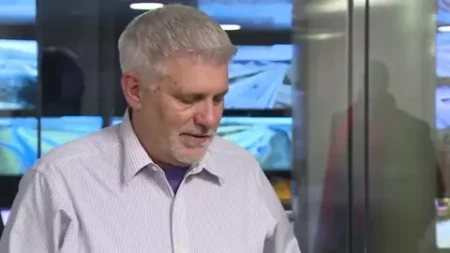U.S. Secretary of State Marco Rubio said Saturday that the incursion of Russian drones into Polish airspace was “unacceptable and dangerous,” though it remains unclear whether Moscow deliberately targeted Poland. The incident has raised fears of direct escalation between Russia and NATO at a critical moment in the war in Ukraine.
The confrontation unfolded earlier this week when Poland shot down drones that crossed its airspace, marking the first known instance of a NATO member firing on Russian drones since the conflict began. NATO announced on Friday that it will strengthen defenses along its eastern flank in response.
“We think it’s an unacceptable and unfortunate and dangerous development,” Rubio told reporters before departing for Israel and Britain. “No doubt about it: the drones were intentionally launched. The question is whether the drones were targeted to go into Poland specifically.”
He added that if evidence confirms Russia deliberately directed the drones toward Poland, “that’ll be a highly escalatory move.” However, Rubio cautioned that several explanations remain possible and emphasized the importance of consulting allies before drawing conclusions.
Poland has taken a hard line, rejecting U.S. President Donald Trump’s suggestion that the incursions could have been accidental. In a rare public contradiction of Washington, Poland’s foreign minister said Warsaw expects stronger U.S. action to show solidarity with one of America’s closest European partners.
At the United Nations, U.S. officials described the violations as “alarming” and pledged to “defend every inch of NATO territory.” The statement underscores Washington’s commitment to collective defense under Article 5, which obliges NATO members to respond to attacks against any ally.
Russia, for its part, acknowledged conducting strikes on Ukraine during the time of the incidents but denied targeting Poland. Moscow insisted that the drones were not intended to cross into Polish territory, portraying the violation as accidental amid ongoing attacks on Ukrainian infrastructure.
The incident highlights the growing risks of miscalculation as the war enters a new phase. NATO officials have long warned that spillover from Russia’s assault on Ukraine could drag alliance members into direct confrontation. With Poland sharing a long border with Ukraine and hosting NATO military deployments, any breach of its sovereignty carries heightened significance.
The use of drones has been central to Russia’s campaign against Ukraine. According to recent reports, Moscow launched more than 6,500 drones and missiles in July alone — ten times the level of the previous year. Strikes have hit civilian targets in Kyiv, damaged diplomatic buildings, and violated NATO airspace, fueling concerns about deliberate testing of alliance defenses.
For Poland, the latest incident reinforces its role at the frontline of European security. Warsaw has consistently pushed NATO and the European Union for stronger action against Moscow, including tougher sanctions and expanded military support for Kyiv. Its firm rejection of Trump’s assessment reflects Poland’s insistence on a clear U.S. stance as the conflict intensifies.
Rubio’s comments point to ongoing uncertainty about Moscow’s intent, but they also underscore the potential for escalation if deliberate targeting is proven. Analysts warn that even unintended incursions could trigger crisis scenarios if they result in casualties or damage inside NATO territory.
The drone incident comes at a time of mounting international pressure on Russia. Western nations are expanding sanctions on Moscow’s oil trade, defense supply networks, and financial lifelines in a bid to weaken its ability to wage war. Meanwhile, Ukraine continues to press for additional military aid, including advanced air defense systems, to counter Russia’s growing reliance on drone warfare.
As NATO prepares to bolster defenses and Poland demands solidarity, the question of whether the drone incursions were intentional remains unresolved. For now, the alliance faces a delicate balance: avoiding escalation while signaling to Moscow that violations of NATO territory will not go unanswered.







